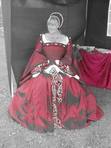Judith Arnopp's Blog, page 31
October 1, 2019
Katherine - Tudor DuchessNew from Tony Riches, Author of ...
Katherine - Tudor DuchessNew from Tony Riches, Author of the best-selling Tudor TrilogyAvailable in eBook and paperback from Amazon UK and Amazon US (Audiobook edition coming in 2020)
 Attractive, wealthy and influential, Katherine Willoughby is one of the most unusual ladies of the Tudor Court. A favourite of King Henry VIII, Katherine knows all his six wives, his daughters Mary and Elizabeth and his son Edward.
Attractive, wealthy and influential, Katherine Willoughby is one of the most unusual ladies of the Tudor Court. A favourite of King Henry VIII, Katherine knows all his six wives, his daughters Mary and Elizabeth and his son Edward.When her father dies, Katherine becomes the ward of Tudor knight, Sir Charles Brandon. Her Spanish mother, Maria de Salinas, is ueen Catherine of Aragon's lady in waiting, so it is a challenging time for them all when King Henry marries the enigmatic Anne Boleyn.
Following Anne's dramatic downfall, Katherine marries Charles Brandon, and becomes Duchess of Suffolk at the age of fourteen.After teh short reign of young Catherine Howard, and the death of Jane Seymour, Katherine and Brandon are chosen to welcome Anna of Cleves as she arrives in England. When the royal marriage is annulled, Katherine's good friend, Catherine Parr becomes the king's sixth wife, and they work to promote religious reform. Katherine's young sons are tutored with the future king, Prince Edward, and become his friends, but when Edward dies his Catholic sister Mary is crowned queen. Katherine's Protestant faith puts her family in great danger - from which there seems no escape.
Katherine's remarkable true story continues the epic tale of the rise of the Tudors, which began with the best-selling Tudor trilogy and concludes with the reign of Queen Elizabeth I.

Author Bio
 Tony Riches is a full time UK author of best sellng historical fiction. He lives in Pembrokeshire, West Wales and is a specialist in the history of the Wars of the Roses and lives of the early Tudors. Tony's other publishedd historical fiction novels include: Owen -Book one of the Tudor Trilogy, Jasper - Book two of the Tudor Trilogy, Henry - Book Three of the Tudor Trilogy, Mary - Tudor Princess and Brandon - Tudor Knight. For more information about Tony's books please visit his website: tonyriches.com and his blog, The Writing Desk and find him on Facebook and Twitter @tonyriches
Tony Riches is a full time UK author of best sellng historical fiction. He lives in Pembrokeshire, West Wales and is a specialist in the history of the Wars of the Roses and lives of the early Tudors. Tony's other publishedd historical fiction novels include: Owen -Book one of the Tudor Trilogy, Jasper - Book two of the Tudor Trilogy, Henry - Book Three of the Tudor Trilogy, Mary - Tudor Princess and Brandon - Tudor Knight. For more information about Tony's books please visit his website: tonyriches.com and his blog, The Writing Desk and find him on Facebook and Twitter @tonyriches
Published on October 01, 2019 23:24
August 4, 2019
Sir Thomas Wyatt: Diplomat, Poet, Lover
 Thomas Wyatt by Holbein the youngerThomas Wyatt’s portrait suggests he was a discontented fellow. His eyes are troubled, mentally tortured even, his mouth down-turned, his cheeks sagging, as if he is tired of life and living.
Thomas Wyatt by Holbein the youngerThomas Wyatt’s portrait suggests he was a discontented fellow. His eyes are troubled, mentally tortured even, his mouth down-turned, his cheeks sagging, as if he is tired of life and living. But maybe we are swayed by the stories we’ve all heard of his unhappy marriage, his unrequited love for Anne Boleyn, his lovelorn poetry, his enforced exile, false imprisonment. But what do we really know?
Was Tom Wyatt really the tortured poet and lover that we like to think he was? There are plenty of known facts about him, placing him in a certain place at a certain date, clues we can pick up and learn from. There is the aforementioned portrait by Holbein, various letters and papers, a biography of Anne Boleyn, written by his grandson, George Wyatt…and, closest to his heart of all, there is his poetry.
Born in 1503, Thomas Wyatt was destined for life in the royal court, his father remained in high favour since his support of Henry VII at Bosworth, and Wyatt’s first recorded presence is in the entourage of the christening of Princess Mary. (A future queen, incidentally, who would one day be responsible for the beheading of Wyatt’s son after the Lady Jane Grey affair in 1554.)
In a dynastic power match Wyatt was married to Elizabeth Brooke in 1520, a union that, despite the birth of Thomas Wyatt the younger, proved both unhappy and unsuccessful. In later years Wyatt, after accusing her of adultery, parted company with his wife to live openly with his mistress, Elizabeth Darrell.
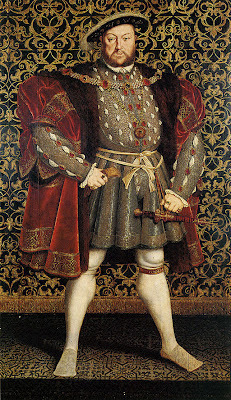 Henry VIII - the Chatsworth PortraitOne of Henry VIII’s esquires of the body, he became one of the King’s intimates, entering into the courtly pastimes--jousting, hunting and dancing. Like Henry, Wyatt wrote verses, an important component of the courtly love games that were so popular among the royal household. These poems were often left where a girl could find them, or offered as tokens; sometimes the poems were altered or embellished by another hand before being passed on. They were not published in his lifetime and in all probability never meant for close interpretation. Due to Wyatt’s central role in the story of Anne Boleyn however, history has decided otherwise.
Henry VIII - the Chatsworth PortraitOne of Henry VIII’s esquires of the body, he became one of the King’s intimates, entering into the courtly pastimes--jousting, hunting and dancing. Like Henry, Wyatt wrote verses, an important component of the courtly love games that were so popular among the royal household. These poems were often left where a girl could find them, or offered as tokens; sometimes the poems were altered or embellished by another hand before being passed on. They were not published in his lifetime and in all probability never meant for close interpretation. Due to Wyatt’s central role in the story of Anne Boleyn however, history has decided otherwise.It must have been during this carefree period of Henry VIII’s reign that Wyatt’s romantic interest in Anne Boleyn was first piqued. As part of Queen Katherine’s household Anne would have been fair game for Wyatt’s attention but, when it became clear that Henry had set his sights on the same target, Wyatt either withdrew or was sent by the king on a mission that took him away from court.
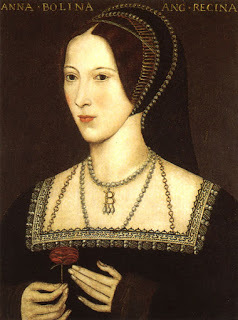 Anne Boleyn: the Hever portraitMost historians seem to agree that some sort of an attachment existed between Thomas and Anne but we can only guess at the extent of it. Some read a physical involvement into the poems but it seems to me to have been one sided. Although there seems little doubt in the depth of Wyatt’s involvement, at the time he first began to make reference to Anne, she was engaged in a liason with Henry Percy, an affair that was quickly nipped in the bud by Cardinal Wolsey. I am not skilled enough to judge the quality of Wyatt’s poetry but his particular choice of words and nuances of meaning can leave no doubt as to his state of mind. This is love if ever I saw it. A riddle, punning on the name ‘Anna’, points to the possible identity of his secret lady.
Anne Boleyn: the Hever portraitMost historians seem to agree that some sort of an attachment existed between Thomas and Anne but we can only guess at the extent of it. Some read a physical involvement into the poems but it seems to me to have been one sided. Although there seems little doubt in the depth of Wyatt’s involvement, at the time he first began to make reference to Anne, she was engaged in a liason with Henry Percy, an affair that was quickly nipped in the bud by Cardinal Wolsey. I am not skilled enough to judge the quality of Wyatt’s poetry but his particular choice of words and nuances of meaning can leave no doubt as to his state of mind. This is love if ever I saw it. A riddle, punning on the name ‘Anna’, points to the possible identity of his secret lady.What word is that that changeth not,
Though it be turned and made in twain?
It is mine answer, God it wot,
And eke the causer of my pain.
It love rewardeth with disdain:
Yet is it loved. What would ye more?
It is my health eke and my sore.
It could, of course, be another Anna, it was a common enough name. It is not until you read all the poems as one unit that the argument for the object of his passion being Anne Boleyn becomes stronger.
The following poem is believed to have been written later, and the lines were altered at some point to make them less dangerous. The line "Her that did set a country in a roar" was changed to read, "Brunet, that set my wealth in such a roar". Obviously the initial reference to Anne was far too explicit, after all, what other ‘brunet’ of his acquaintance had ‘set the country in a roar?’ If waker care, if sudden pale colour,
If many sighs, with little speech to plain,
Now Joy, now woe, if they my cheer disdain,
For hope of small, if much to fear therefore;
To haste to slack my pace less or more,
Be sign of love, then do I love again.
If thou ask whom; sure, since I did refrain
Her that did set our country in a roar,
Th'unfeigned cheer of Phyllis hath the place
That Brunet had; she hath and ever shall.
She from myself now hath me in her grace:
She hath in hand my wit, my will, my all.
My heart alone well worthy she doth stay,
Without whose help, scant do I live a day.
Taken individually, Wyatt’s poetry could refer to anyone, it is not until you come to the most famous verse of all that arguments against it being Anne begin to collapse. It could, I suppose, have been poetic licence or wishful thinking but surely, the words are too personal for that. In my opinion these lines can only have been written by a man who has lived them and it is this poem that endorses all the others. There is no need, I think, to explain the meaning, Wyatt speaks as clearly now as he did then but he also illustrates, quite clearly, that the attachment was one-sided and, at least by the time that this verse was written, Anne belonged to Henry:
Whoso list to hunt, I know where is an hind,
But as for me, alas, I may no more,
The vain travail hath wearied me so sore.
I am of them that farthest cometh behind;
Yet may I by no means my wearied mind
Draw from the Deer: but as she fleeth afore,
Fainting I follow. I leave off therefore,
Since in a net I seek to hold the wind.
Who list her hunt, I put him out of doubt,
As well as I may spend his time in vain:
And, graven with diamonds, in letters plain
There is written her fair neck round about:
Noli me tangere, for Caesar's I am,
And wild for to hold, though I seem tame.
Another poem, possibly written after Noli Me Tangere shows Wyatt trying to reconcile himself to the fact that he has lost, trying to convince himself (and others perhaps) that his affection had been nothing but folly. But, all these years later, are we convinced? Or do the words smack of bravado? How many of us have shrugged our shoulders and said, ‘I never loved him anyway’?
Some time I fled the fire that me brent
By sea, by land, by water and by wind;
And now I follow the coals that be quent,
From Dover to Calais against my mind.
Lo how desire is both sprung and spent!
And he may see that whilom was so blind,
And all his labour now he laugh to scorn,
Meshed in the briars that erst was all to-torn.Wyatt continued to serve the king. He was made High Marshal of Calais and Commissioner of the Peace of Essex. In 1532 he accompanied the King and Anne, who was by then the King's mistress, on their visit to Calais and when the royal divorce was finally granted Anne Boleyn married the King in January 1533. Wyatt served in her coronation in June and in 1535 he was knighted but a year later, when Anne’s fortune turned, Wyatt’s former attachment for the queen almost dragged him down with her.
It is said that he witnessed Anne's execution, from the window of his prison in the Bell Tower, writing a lengthy elegy to the men who died alongside her, and making no secret of his broken heart. He also remembered her in another verse, although he still does not dare to mention her name.
These bloody days have broken my heart.
My lust, my youth did them depart,
And blind desire of estate.
Who hastes to climb seeks to revert.
Of truth, circa Regna tonat. (around the throne it thunders)
The bell tower showed me such sight
That in my head sticks day and night.
There did I learn out of a grate,
For all favour, glory, or might,
That yet circa Regna tonat.Some say it was thanks to Cromwell that Thomas Wyatt escaped execution, but he may well have suffered the more for surviving. A diplomat as well as a politician, his subsequent career took him back to Europe where he became involved in intrigue and espionage, leading to his capture and ransom by Spain. His involvement in the attempted assassination of Reginald Pole led (somewhat ironically) to an accusation of treasonable contact with the king’s enemies and a second spell in the Tower.
As a diplomat (some say spy) Wyatt was in constant danger, and wherever he travelled, he will have taken his memories with him. He doesn’t seem to have achieved happiness and some biographers have accused him of revelling in poetic misery. That may be a little harsh. It is easy to sit in our secure, warm environment and judge those who lived in tougher times. I think we can say Thomas Wyatt was a man who, although unfortunate in love, understood love. I think we can say he suffered for his love, and I think we can say he was a victim of the times he lived in – yet another victim of Henry VIII. He died of a fever in 1542, just six years after Anne and in a letter written to his son in 1537 he described his life as "a thousand dangers and hazards, enmities, hatreds, prisonments, despites and indignations"
A full account of Anne Boleyn's life, featuring her relationship with Wyatt can be read here.
Buy Now
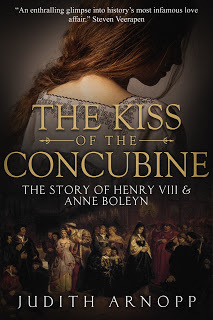
I explore the relationship between Anne and Wyatt Here
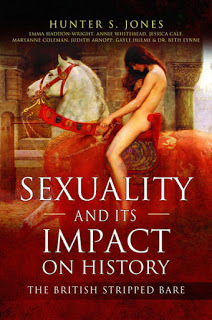
Judith is the author of eleven historical fiction novels and is currently researching and writing the life of Mary Tudor, Queen of England.
author.to/juditharnoppbooks
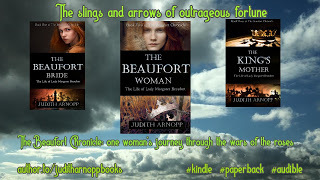
Published on August 04, 2019 03:03
June 26, 2019
What did Anne Boleyn really look like?
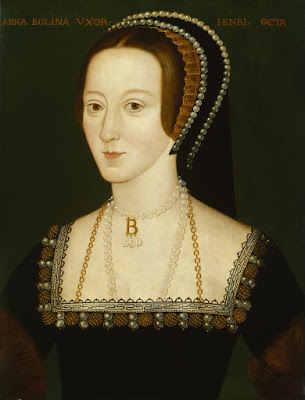 Anne Boleyn, National Portrait Gallery
Anne Boleyn, National Portrait GalleryI am often told that readers are fed up with Tudors. They know the stories, they’ve heard it all. The need for Tudor novels is over. But the reading public doesn’t seem to believe that. Since I first became an author of historical novels the most recurrent question has been, “Have you written any Tudor books?”
It seems to me that the reading public, both in England and especially overseas, cannot get enough of Henry and his wives. I think the reason for this is not just the glitz and the danger of Henry’s court; it is the many different interpretations we can put upon the stories and the people that inhabit them. There are more explanations for what went on than there are stars in the skies, and there are novelists enough to encompass them all. Added to that of course is that new generations are emerging all the time; a new batch of people who know nothing about the Tudors.
Anne Boleyn remains the number one favourite; the wife that everyone loves to read about. She has been depicted in many different ways; a schemer, a witch, a victim, a whore. She has been demonised by some novelists, and sanctified by others but how close to we ever come to the real Anne? We can never really know the truth about her, we can only piece little snippets together to make up a shadow of the real woman. That is what makes history, and enigmatic figures like Anne, so irresistible. Anne Boleyn was, and still is, a fascinating woman who deserves after all this time a fair reappraisal of her life and death. In his nonfiction book The Life and Death of Anne Boleyn, Eric Ives, now sadly passed on, reveals a credible figure. He has done the hard work for us, demolishing many of the myths that in the space of several centuries have solidified into fact, and illustrating that what remains is an intelligent, ambitious, but God-fearing woman who happened to win the love of a king.
It is refreshing to discover that perhaps Anne was not a scheming witch with a penchant for sleeping with half the court, (her brother included). Nor was she a woman who gave birth to a monster and plotted the death of the king. Ives’ research reveals someone more sinned against than sinning, and a woman whose mistakes were human ones. Anne was a queen who failed to produce an heir, and a woman who fell foul of the King’s most powerful advisers. The woman that emerges from Ives’ research is the Anne Boleyn that walks the pages of my novel The Kiss of the Concubine.
To be honest, the real Anne is so obscured by myth and legend that we know much less about her than we think we do. We are not even sure what she looked like. We think of her as dark haired and thin but the familiar portraits we see of her are not contemporary; the originals were lost long ago. Experts disagree, but the oldest 17th century portrait now in the National Portrait Gallery is likely to be a copy of an original, and is favoured by Eric Ives as being the one that comes closest to a real likeness.
There are several written descriptions from her contemporaries and, while none rate her as a great beauty, none remark upon any physical failing either. The fact that she doesn’t emerge as breathtakingly beautiful is refreshing, and illustrates that Henry may have been more taken with the personality within, than with an alluring or fashionable face and figure.
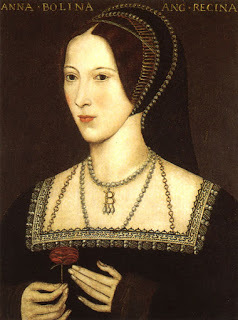
Brantome, a courtier from France, wrote in his memoirs that Anne Boleyn was ‘the fairest and most bewitching of all the lovely dames of the French court.’ (Weir, p. 151) And Lancelot de Carles stated that she was beautiful with an elegant figure and was ‘so graceful that you would never have taken her for an Englishwoman, but for a Frenchwoman born.’ (Weir, p. 151)
This is praise indeed, perhaps a little too flattering to be true, and many eyewitnesses agree that her looks were unfashionable and not to every one’s taste. As Francesco Sanuto, a Venetian diplomat, illustrates with his description of Anne as ‘Not one of the handsomest women in the world; she is of middling stature, swarthy complexion, long neck, wide mouth, a bosom not much raised and eyes which are black and beautiful.’ (Ives, p. 40)
It is only after her death that the really detrimental reports begin to emerge. Writing in the reign of Elizabeth I, Catholic supporter, Nicholas Sander, describes Anne as, “rather tall of stature, with black hair and an oval face of sallow complexion, as if troubled with jaundice. She had a projecting tooth under the upper lip, and on her right hand, six fingers. There was a large wen under her chin, and therefore to hide its ugliness, she wore a high dress covering her throat. In this she was followed by the ladies of the court, who also wore high dresses, having before been in the habit of leaving their necks and the upper portion of their person uncovered.” (Ives. P.39)
 attributed to John Hoskins [Public domain]
attributed to John Hoskins [Public domain]But, although there are common factors when it comes to colouring and bone structure in all these descriptions, I think we can dismiss the idea that she was seriously disfigured in any way. The 16th century was a superstitious time and the characteristics described here all point to witchcraft. It is a clear attempt by Sander to demonise the former queen. Even had the king not been superstitious, I cannot image Henry VIII, who had the pick of the court ladies, finding a woman disfigured in this way to be even remotely attractive, let alone spend seven years of his life trying to get her into his bed. You can read a more in depth look at Anne’s appearance on an earlier blog I wrote for the English Historical Fiction Authors here.

Anne was accused of adultery, incest, high treason, and plotting to kill the King, and she died for those crimes. Yet none of these charges would stand up in a modern day courtroom. Eric Ives states that it can be proved that she was elsewhere on at least twelve of the occasions when she is supposed to have been committing adultery. The only actual ‘confession’ came from her musician Mark Smeaton, who we believe was subjected to torture in the Tower. Although Anne’s sister in law, Jane Rochford, gave evidence against Anne and her husband, George, she later retracted it in February 1542 before she herself faced execution for her involvement with Katherine Howard’s downfall.
While Anne was imprisoned in the Tower, Henry had his marriage to her annulled on the grounds of his former relationship with Anne’s sister, Mary. This made their daughter Elizabeth illegitimate. In truth, this should also have made the charge of adultery invalid, but this was Tudor England when justice was anything but just.
So, those are the bare facts. We can assume Anne was dark, and had attractive eyes and an oval face. We know she was intelligent and witty; even her detractors credit her with that. We know she was pious and refused to be Henry’s mistress, holding out until he promised marriage. That could make her a schemer, but equally it could make her chaste. During her marriage to Henry she tried and failed to produce a son, suffering several miscarriages and providing the king with just one daughter, later to become the greatest queen that has ever lived, Elizabeth. We also know that Anne worked in tandem with Cromwell and others toward church reform, and we also know that at a later stage there was a disagreement between them, and Anne’s downfall followed swiftly after.
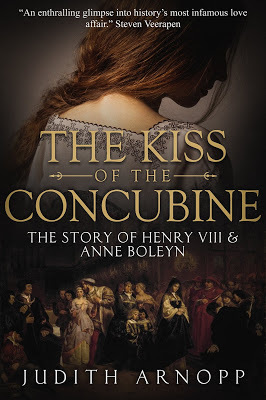
Most novels of Anne I have read (but I confess I haven’t read them all) hold Henry alone to blame for Anne’s downfall. They show him as falling out of love with Anne, and place Jane Seymour as the sinister ‘other woman’ whose presence at court and her influence over the fickle king makes Anne’s fall inevitable. There is little evidence to suggest this and perhaps there were other reasons; perhaps another agenda came into play. Perhaps it was politics and not passion that killed her.
In writing The Kiss of the Concubine I have worked closely with the writing of Eric Ives and other prominent Tudor historians to come up with a less clichéd reason as to why Anne Boleyn had to die on that bright May morning in 1536.
The Kiss of the Concubine is now published with Sharpe Books and is available on Kindle and Audible or you can read FREE with Kindle Unlimited. mybook.to/tkoc2
Further reading
Lispcombe, Susannah, 1536: The Year that Changed Henry VIII, 2009.Fraser, A. The Six Wives of Henry VIII, 1992.Ives, E. The Life and Death of Anne Boleyn, 2004.Weir, A. The Six Wives of Henry VIII, 2007.Weir, A. Mary Boleyn, 2011.Weir, A. The Lady in the Tower,2009.Fox, J. Jane Boleyn, 2007.Denny, J. Anne Boleyn, 2007.
Published on June 26, 2019 01:06
June 25, 2019
Author interview with Walter Gunn
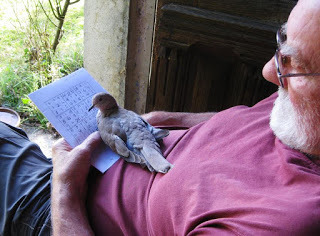 Walter Gunn is the author of the Billy Ruffian's Courier naval espionage series.
Walter Gunn is the author of the Billy Ruffian's Courier naval espionage series. Hi Walter, thank you for agreeing to come on my blog. Tell us a little bit about yourself and your background.
For one reason or another, I missed much of my earlier education. Things didn't get much better at the Secondary Modern I attended: it was pretty dire - its only claim to fame was two of its ex pupils discovered a waterless lake in Australia - I kid you not.
I've had my revenge though, in my 'Billy Ruffian's Courier' series, I wrote in some pretty horrible deaths for those teachers I found particularly obnoxious. I saved till last, and most awful, that of the headmaster - this gave much pleasure and, I must say, lasting satisfaction... he should never have caned me!
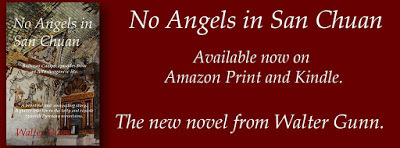
Which writers inspire you?
There are so many. I live in awe of those past authors who wrote their mss long-hand. But, first and foremost they have to be capable of telling a good story. Names that quickly come to mind are; Dickens, Andy Weir (The Martian), Gabriel Garcia Marquez - A Hundred Years of Solitude and 'Chronical of a Death Foretold', Garrison Keeler for pure entertainment - 'Lake Woebegon Days'. My list could not be complete without Hilary Mantel -'Fludd', 'Every Day is Mother's Day' and of course 'Wolf Hall' and 'Bring up the Bodies'. Apsley Cherry Garrard's 'Worst Journey in the World' made me feel chilled - now, I find I can only dip into it in the summertime. Then there're Lauried Lee, HE Bates, the list could go on and on... Good God, did I really miss out Jane Austen?
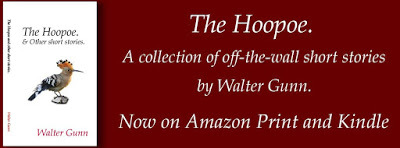
Would you tell us about your latest book?
'No Angels in San Chuan.'
Many years ago before I dreamt of moving to Aragon, we were at a dinner with a hang-gliding friend of ours and she told us of landing high up in the mountains where an old man tottered out of an even older stone barn and thought she was an angel - that charming seed lay dormant for many years. Later I moved to the Pyrenees and met old men in their mountain huts who could have been him; the seed started to germinate.
Where can we buy or see it?
Buy it on Amazon worldwide - print or Kindle - mybook.to/NoAngelsinSanChuan. And, when I sell the film rights, see it at a cinema near you.
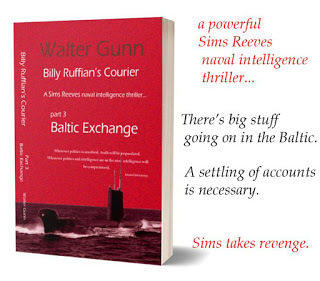
What draws you to a genre?
My fancy at the time. 'Billy Ruffian's Courier' and 'No Angels in San Chuan' are completely different genres. They were both written from a lot of background knowledge and affection. Then there are 'The Snail Cookbook' and 'A Slice of the Pyrenees', again written from experience and affection - I live in a gastronomic area, I cook, and I love food. 'The Hoopoe' is a collection of my short stories. Most of these were ideas I didn't think would stand the strain of being fleshed out as full novels. Though, I am beginning to have second thoughts about this decision - I am being pressured to extend three of them in particular; 'Reverend Selby's Heresy', 'Hawksett & Burroughs' and 'Lucid'.
How much research do you do?
Not much really. I check a few dates and facts about the main characters and that's about all.
When did you decide to become a writer?
I never made the decision, the occupation grew steadily - it crept up on me stealthily. I looked round one day and found I was a writer. I suppose it really started when I wrote a few articles for international sporting magazines that went down well. I also wrote for corporate newsletters - this was good practice; accountancy firms, aircraft instrument manufacturers, medical equipment design and office furniture. The variety of clients meant swapping genre hats on a daily basis - all good practice for writing the novels I'm now involved with.
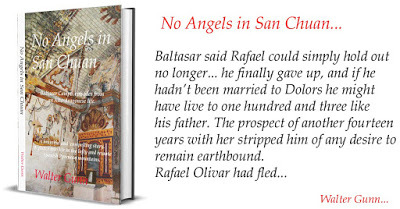
Do you write full-time or part-time?
I'm retired so you could say full time - things take so much longer at my age.
Do you have a special time to write or how is your day structured?
Between 1800 and 2000 every evening - the rest of the time I'm either cooking or thinking about what I'm going to write that evening. Where do your ideas come from?
A good question, and one I've asked myself often. "Where the hell did that come from?" a common outburst when I'm writing. It's a lovely process.
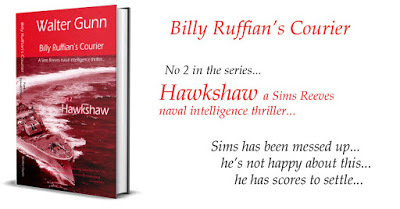
What is the hardest thing about writing?
Trying to get a literary agent and publisher. It's mystifying how I can get completely unsolicited reviews, posts and communcations from people who've read my books, yet agents are just not interested - I guess many 'indi' writers are in a similar position. What is particularly galling is that some of the books that do make it to the market are complete rubbish. What was the hardest thing about writing your latest book?
I didn't find it difficult at all. I simply sat there and it poured out. 'No Angels in San Chuan' takes place in an area I know well. While living there in Spanish Pyrenees in Aragon, I made many friends, heard many tales and fell in love with the mountain people and their way of life. It really wasn't hard.
What is the easiest thing about writing?
Writing from experience and watching what comes out from the end of the pen... I love the way characters will sometimes barge their way into the story and make it easy for me. In'Billy Ruffian's Courier', I introduced a girl called Joss. She was only intended to be a foil for one particular conversation. Post chat. she just refused to leave and is now part of the complete trilogy. Do you ever get writer’s Block?
Only when confronted with Income Tax forms.
For your own reading, do you prefer ebooks or traditional paper/hard back books?
Definitely paperback; there is something special about looking at a book on the shelf and knowing if I open it there is a complete and different world inside: this gives me the sense of other dimensions - other worlds that are real and existing between two covers.
From a commercial point of view, print books are better for marketing. When being read in public - trains, buses ect. people can witness them. This is not possible with ebooks - the author, contents and cover remain anonymous. What book/s are you reading at present?
At the moment I'm not reading anything. I'm involved with writing another in the 'Billy Ruffian's Courier' series - I rarely read other works when I'm head first in my own work. I find it too damn distracting.
Thank you Walter Gunn for talking to us today. I hope you will come back soon. Author Profile Walter Gunn
 Walter Gunn is the author of the Billy Ruffian’s Courier naval espionage series. During the period the series is set, the author was, like the hero, a Royal Naval marksman, fast launch pilot and sailor. The backdrop and substance of these books are thus based on his first hand experience. On leaving the Royal Navy, he became a motor racing engineer and constructor; hang glider designer and test pilot - he competed in the 1st World Hang Gliding Championships. Walter was the managing director of a leading edge sports aviation company. His creation of the extreme sport ‘Speed Gliding’ can be viewed as a natural corollary of his passion for speed and excitement.
Walter Gunn is the author of the Billy Ruffian’s Courier naval espionage series. During the period the series is set, the author was, like the hero, a Royal Naval marksman, fast launch pilot and sailor. The backdrop and substance of these books are thus based on his first hand experience. On leaving the Royal Navy, he became a motor racing engineer and constructor; hang glider designer and test pilot - he competed in the 1st World Hang Gliding Championships. Walter was the managing director of a leading edge sports aviation company. His creation of the extreme sport ‘Speed Gliding’ can be viewed as a natural corollary of his passion for speed and excitement. He has written for specialist magazines and co-written, designed, researched and produced quality corporate newsletters. He is a capable photographer - his images have been published by national and international magazines, and his sporting video footage by television.
Walter Gunn has travelled the world extensively both as sailor and as vice president of the Fédération Aéronautique Internationale (FAI) Speed Gliding World Series. He has lived for more than twelve years in the Pyrenees. Walter speaks enough French and Spanish to get by.
He has written and published four Novels: No Angels in San Chuan, Billy Ruffian’s Courier - Part one: Rites of Passage; Billy Ruffian’s Courier - Part two: Hawkshaw; Billy Ruffian’s Courier - Part three: Baltic Exchange. There is also his book of short stories: The Hoopoe.
His cookery books include: A Slice of the Pyrenees; The Well Thumbed Cookbook and The Snail Cookbook.
He is currently writing Billy Ruffian’s Courier - Part Four: Baltic Exchange. Books by Walter Gunnbuy link
The Hoopoe.
No Angels in San Chuan.
Billy Ruffian's Courier - Part one - Rites of Passage.
Billy Ruffian's Courier - Part two - Hawkshaw.
Billy Ruffian's Courier - Part three - Baltic Exchange.
A Slice of the Pyrenees
The Snail Cookbook All titles on Amazon www.gunncomms.co.uk
Published on June 25, 2019 01:32
June 19, 2019
Interview with Edward Seymour

As part of the Historical Writer's Forum Interview my Character Blog Hop I have the honour of interviewing Edward Seymour, 1st Duke of Somerset, brother of Queen Jane and uncle to Edward VI. and Protector of the Realm. Edward is the main character in Janet Wertman's book - The Path to Somerset. Welcome my lord, please take a seat ...
Tell us about your sister Jane, what was she like? Did she set out to snare Henry? Do you think the king really loved her best?
Sigh. Jane did not set out to snare Henry. She was a quiet, pale, plain young lady and she was as shocked as we all were that the King fell in love with her. But once his interest was piqued, she had only one choice. And yes, of course Henry loved her best: she brought out the best in him, she gave him the son he needed – and she died before he could tire of her. The perfect woman.
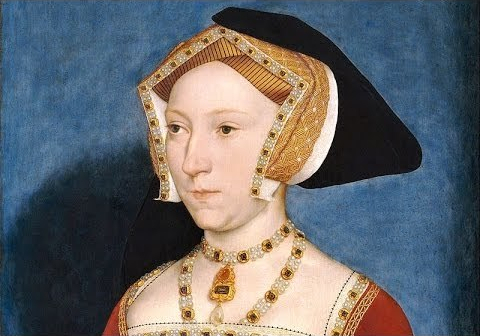
I suppose you would say that about your sister, you were a close-knit family. There are rumours that your first wife, Catherine Filliol, had a relationship with your father. Do you believe that to be the case, are your two eldest sons actually your brothers?
The world has never stopped snickering at me over that one, or defining my life by that shame. Yes, it happened. Yes, I had to disinherit the boys I had thought of as sons. Yet while this was the cross I had to bear in life (until my Calvary on Tower Hill), the Lord in His mercy softened the blow: those living symbols of betrayal atoned for the sin of their origin with total loyalty. They accompanied me to the Tower and almost perished with me. They were better brothers to me than Tom ever was and I loved them for it.
It must have been dreadful in the Tower yet many ambitious men end up there. What were the problems between you and the Duke of Norfolk?
What weren’t the problems between me and Norfolk? He was Catholic while I was Protestant. He was old while I was young. He was old blood while I was a new man. And yet, as you say nowadays, all that was “just business.” We actually got along well enough and could easily have persisted forever as advisors to Henry – but we both knew that after Henry died, there would be room for only one of us.

King Henry’s death coincided with a huge shift in power. Was this a carefully planned manoeuvre or spur of the moment? What was your part in it?
Each of Henry’s wives after Jane represented a giant political opportunity - or liability. Anne of Cleves was to have turned Henry Protestant for one and for all, but then Catherine Howard came along and pulled the King back to Catholicism. That young girl’s disgrace and bad judgment were our great good luck as they allowed us to swing the pendulum back to another Protestant, Katherine Parr. Of course, that move came close to backfiring when Gardiner attacked her. If Gardiner had succeeded, the King would surely have taken a Catholic bride (they were proposing his own son’s widow, Mary Howard, for goodness sakes). But as much as I was part of the fight, it was the Lord’s intervention that won it for us. Only that could explain the stupidity of the conservatives who dealt themselves two death blows on the very same day. First, Surrey actually quartered the arms of Edward the Confessor on his shield, clearly asserting his claim to the throne. Then Gardiner refused to exchange lands with Henry (the same sin that had sent Nicholas Carew to the block). From that day forward, Surrey and Norfolk were imprisoned and Gardiner was banished, leaving no one to restrain me and the reformers.
I see. The imprisonment of Surrey and Norfolk gave you a clear run at taking control of the boy king. Did you and your cohorts manipulate King Henry to change his will in your favour?
Why do you call it manipulation? Henry had originally drawn up his will when Norfolk and Gardiner were in high favour; the document needed to be changed once they had shown their true colors. Admittedly, there were rich gifts in the final version, but that was to assure the personal power and loyalty of myself and the other men who would be guiding the young Edward VI and keeping him safe.
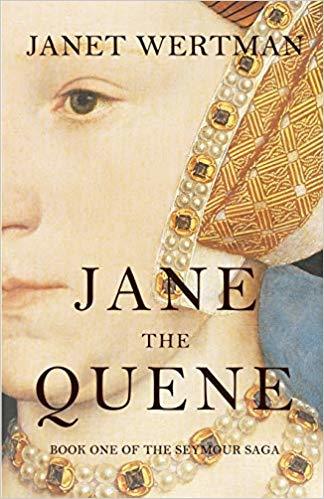
So you were motivated by family loyalty rather than riches. The king’s will did not appoint a Protector but within a very short time you were ‘elected’ as such. Do you have anything to say regarding this?
Don’t be naïve: look at society. You cannot keep power dispersed power among twelve men: one of them will come to dominate. That one ruler needed to be me in order to ensure that Edward VI would inherit his throne when he came of age. The Council knew that when they elected me – and were reminded of it after they kicked me out in that first coup. After trying for three months to rule as a group, they realized they did need a leader after all and elected Warwick – he was not yet Northumberland then – President of the Council. Bah.
Thomas’ marriage to the Dowager Queen, Katheryn Parr, must have angered you. Was this the beginning of ill feeling between you or had you always been at odds with him?
My younger brother Tom always overrated his own abilities; he was rash instead of calculating, vain instead of humble. But we never failed to get along – until he married Katherine Parr.The marriage made him look bad. It made her look bad. It made me look bad. It made all of England look bad. Yes I was angry he’d done it. Especially since he seemed to think it should warrant him more power than he deserved – and worked against me to seize it.
Some say that Thomas was simply attempting to speak to his nephew, the incident with the dog a regrettable accident - an accident that took him to the Tower. How did it feel to condemn your brother to death?
It was torture. Signing his death warrant was the hardest thing I’d ever done. But a signature was needed – either mine or my nine-year old nephew’s. I shouldered the burden rather than saddling the boy with it.
![The Path to Somerset (The Seymour Saga Book 2) by [Wertman, Janet]](https://i.gr-assets.com/images/S/compressed.photo.goodreads.com/hostedimages/1561022288i/27696015.jpg)
That was noble of you. When you were waiting execution in the tower did you think of the men who’d died by your order? Did you think of your brother?
How could I not think of my brother? How could I not remember his claims that he was unjustly accused? How could I not wonder what he went through?But your question is not entirely fair. Tom was guilty: he broke into the palace to kidnap the King - and actually killed his dog in a desperate attempt to hide his treason. I was innocent, the victim of Northumberland’s jealousy and lies. It was that innocence that sustained me, that confidence in Heaven’s certain reception.
Thank goodness for your faith. Is that what drove you? Religion? Or was it power?
It feels like you believe I was driven by power. I can’t fault you for that: most people did believe I was overly proud. And yet, I only ever sought to do God’s work...and that was my downfall. I tried to adopt policies that would benefit the common man – but my peers were angry at the threat to their excessive wealth. I also tried to be tolerant of Mary and the others who believed differently than I did, but this allowed Warwick to call me faithless and discredit me to the King. In the end, I accepted my martyrdom and calmed the people who would have risen up to save me. As a result, I met my Maker cloaked in righteousness, and confident that He would judge me far less harshly than posterity.
I am sure posterity will be kind to you, my lord. Time has a way of tempering a man's actions. Thank you for gracing us with your presence this day. It has been an honour.

If you'd like to learn more about Edward Seymour and his sister, Jane, the third wife of Henry VIII Janet Wertman's books J ane the Quene and The Path to Somerset are available on Kindle and Paperback. Click on the links below for more information.
And there’s a giveaway! Janet has kindly offered a paperback copy or a kindle copy of The Path to Somerset to a winner in the US of A, or an ebook to a winner elsewhere in the world. To enter, simply leave a comment below. The draw will be made on 23rd June.
Jane the Quene
The Path to Somerset
Website
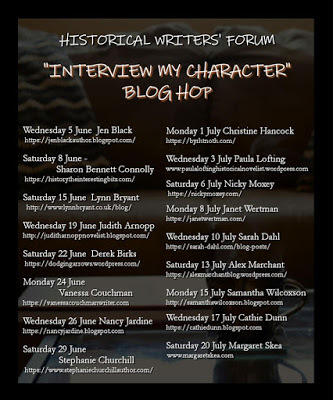
Next in the blog hop is on Saturday 22 June Derek Birks https://dodgingarrows.wordpress.com/ interviews the courageously defiant, Nicholaa de Haye, of Sharon Connolly’s Medieval Heroines
Published on June 19, 2019 00:00
June 10, 2019
Interview with the lovely author Pam Lecky!

Pam is an Irish writer of historical fiction with a particular love of the late Victorian era and early 20th century. Her debut novel, The Bowes Inheritance, was awarded the B.R.A.G. Medallion; was shortlisted for the Carousel Aware Prize 2016; made 'Editor's Choice' by the Historical Novel Society; long-listed for the Historical Novel Society 2016 Indie Award; and chosen as a Discovered Diamond in February 2017. Pam is represented by Therese Coen at the Hardman & Swainson Literary Agency, London. In April 2018, she published a collection of all her short stories, entitled Past Imperfect. With settings as diverse as WW1 era Dublin and a lonely haunted lighthouse, romance, mystery and the supernatural await you. June 2019, will see the release of No Stone Unturned, the first book in the Lucy Lawrence Mystery series, set in the late Victorian era. Pam is looking forward to sharing Lucy's many adventures with her readers.
Hi, thank you for agreeing to this interview. Tell us a little about yourself and your background?
Hi Judith, and thanks so much for inviting me on to your blog. I am an Irish historical fiction author, writing mystery, crime and romantic suspense. I was born and raised in Dublin, Ireland. Married with three children, I work part-time and have a lot to juggle, which isn’t ideal for my writing. Last year, I signed with the Hardman & Swainson Literary Agency in London - a huge step forward in my writing career - and I’m currently working on a new project for them.
What were you like at school?
I didn’t particularly enjoy school as I was an only child and tended to be quite shy. My confidence grew during secondary school, and I started to explore writing. It was mainly poetry in those days and it was pretty awful stuff, though I did win a couple of prizes. However, it will never see the light of day again!
Which writers inspire you?
My father bought me the complete works of Jane Austen when I was eleven. My love of historical fiction was ignited by her words. As I grew older, I discovered other authors, such as Elizabeth Gaskell, Thomas Hardy, Maria Edgeworth, Wilkie Collins and Thackeray, all cementing my love for historical fiction. For those familiar with the 19thcentury world, I think I actually became a bluestocking! I munched my way through classics, dined on crime (modern and historical - Dorothy L. Sayers and P.D. James my absolute favourites – what fantastically twisty minds those women had), and supped at the feet of Georgette Heyer’s heroes and heroines.
Would you tell us about your latest book?
No Stone Unturned is the first book in the Lucy Lawrence Mystery Series which is set in the late Victorian era.
A suspicious death, stolen gems and an unclaimed reward: who will be the victor in a deadly game of cat and mouse?
Lucy Lawrence is trapped in an unhappy marriage and ripe for an adventure. But when she meets the enigmatic private investigator, Phineas Stone, over the body of her husband in the mortuary, Lucy’s life begins to fall apart. When her husband’s dirty secrets continue to spill from the grave, and Lucy’s life is threatened, she must find the strength to rise to the challenges she must face. But who can Lucy trust, and how is she to evade the murderous clutches of London’s most notorious crime gang?
The sequel, Footprints in the Sand, will be published later this year.
Where can we buy or see it?
No Stone Unturned is now live for pre-order on Amazon with the paperback to follow very shortly. Buy Link:
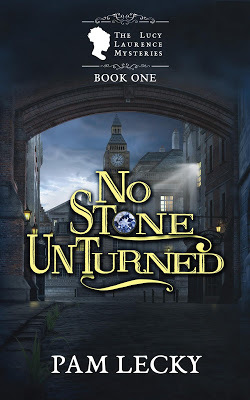
What genre are your books?
I have written a few contemporary short stories, but the majority of my work is historical mystery or romantic suspense.
What draws you to this genre?
There were a lot of influences in my childhood and the earliest one I can remember was television. Historical dramas in particular caught my attention, even though at that young age I didn’t really understand the stories. Ah but the costumes, the architecture and the way people behaved – something clicked. The 19th century was a time of rapid change and I am fascinating by the effect that had on people and society in general. The industrial revolution, the rapid growth of cities and all the inherent problems that generated, make this era interesting to me and the perfect backdrop for my tales.
How much research do you do?
Like all historical fiction authors I suspect I do far too much, but the problem is I love doing it. I often have to drag myself away from it to actually write. For me, research is essential - how else am I to get inside the heads of my characters and tell their stories in an authentic way? Research often throws up great ideas or sub-plots too.
When did you decide to become a writer?
I started to write seriously about sixteen years ago, but I only wrote to prove to myself I could do it - I never intended to publish. My debut novel, The Bowes Inheritance, was published when I was 50, so you could consider me a late starter.
 Buy Link
Buy LinkDo you write full-time or part-time?
As I work part-time I can only write in my free time.
Do you have a special time to write or how is your day structured?
As my time is fairly limited, I write when I can, but it is usually on my days off and over the weekend.
Where do your ideas come from?
Everywhere and anywhere - sometimes through research or just plain daydreaming. Some of my best ideas pop into my head just as I wake or drift off to sleep.
What is the hardest thing about writing?
Besides not having enough time to devote to it, I find the marketing the most difficult part. If there were book launch and marketing fairies, I’d use them!
What was the hardest thing about writing your latest book?
Luckily for me, this was an easy book to write. However, as my female protagonist, who was originally supposed to be a supporting character, started to get louder and more demanding in my head, I had to make the difficult but right decision to rewrite the entire book from her point of view.
What is the easiest thing about writing?
I don’t think there is an easy aspect to it, but I have been lucky in that my daytime job involves editing and proofreading, which has been a considerable asset.
Do you ever get writer’s Block?
Yes, but not too often. It’s usually when the plot hits a wall and I need to come up with a solution (and I love a good twist). For me, relaxing is key. I walk away from the manuscript and listen to music. That usually gets the juices flowing again.
For your own reading, do you prefer ebooks or traditional paper/hard back books?
I love my Kindle, so most of my reading material is on it. It also means I can hide my enormous TBR pile from my husband! For research, I always buy paper or hardback.
What book/s are you reading at present?
I am currently reading The Healer by Sharon Thompson, set in 1950s rural Ireland. A great read so far.
How can readers discover more about you and you work?
I do hang-out online on various platforms and love to interact with readers and other writers. You can find me at the following:
www.pamlecky.com
Amazon Facebook Twitter Instagram Goodreads
Thank you so much for joining us Pam, I am off to pre-order my copy right now!
Published on June 10, 2019 00:45
May 24, 2019
The New Forest - before it was New.
Judith Arnopp
Home of The Forest Dwellersphotographs property of JudithArnopp and CherryWathall

As a child I spent many holidays in the New Forest. In those days we were permitted to camp where we chose; there were no camp sites, no shower blocks, very few other tents and certainly no caravans. I drew on those days when I wrote my novel The Forest Dwellers in 2009.
It was autumn, the forest canopy a blaze of gold with a milky mist curling about the heath. The new day smelt fresh; a hint of thyme and the tang of coming winter tickling our noses. A fox ran across our path and disappeared into the wood and, farther off, we heard the bark of rutting deer, the cry of a curlew.

I recalled playing beneath the wide green canopy of beech, wading in the amber coloured streams and breathing in the stiff Solent breeze. Even though I now live far away in Wales, the soft wildness of the New Forest stayed with me and the scent and sounds of the wood echo through the centuries to provide a back drop for Ælf and Alys, and Leo.
There is something about the forest in the late afternoon. The aromas are richer, the sounds more musical, the shadows deeper and the broken light more dazzling. I am not a man given to fancy but, as we rode through that silent glade, it was as if the wood were holding its breath, waiting for something to happen.

Recently, I had the opportunity to revisit Hampshire and rediscover that lost perfect place of my childhood. It took some looking but, a short walk away from the caravans and campers, I found it. It was concealed in the quieter, lonelier spots and as I ventured deeper into the forest I swear I could hear the song of Ælf's bowstring and the gentle laughter of the people who lived and died there so long ago.
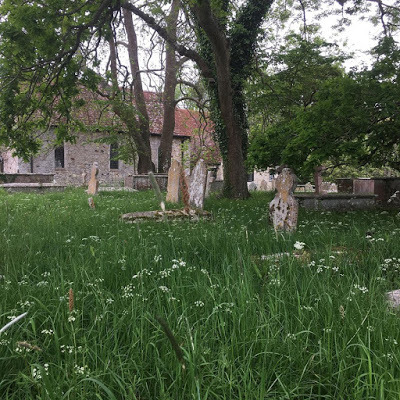
I visited Boldre church. Not the structure where Alys and Ælf worship in my story but a newer 12th century building. The woodland around it has been cleared now but the peace remains and the birdsong is just as loud. I half-closed my eyes and imagined it as it might once have been.
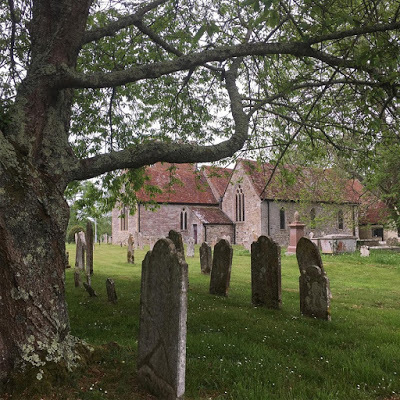
A light drizzle began to fall soon after we left the camp and by the time the wooden shingles of the church roof came into sight, we were all mired to the knees. Boldre church was an ancient structure built by the first Christians ever to venture as far as Ytene. The wooden walls were full of rot and the flagstone aisle had subsided so far into the boggy soil that it drove the congregation toward the altar whether they wanted to reach it or not.It was colder than death. I looked around at the pinched noses of my fellows and acknowledged to myself that at least hell would be warmer. Beside me, Alys clutched a warming stone beneath her cloak. Its heat must have dwindled by now but she refused to give up on the tiny remnant of comfort that lingered. Sensing me looking at her, she smiled cheerfully, a glimmer of snot at her nostril. At her side, Leo shifted from foot to foot, bored and frustrated; he wanted to leave as badly as me. I guessed he was wishing he had not been swayed by Alys’ wiles and had stayed at camp with the other men, and it wasn’t long before I felt that way too.By the time the droning priest had reached the end of his sermon, people were stamping their feet and clapping their arms to warm their blood. But, at last, the service was at an end and we tumbled from the church door to find gentle snow had begun to fall. We trudged home through the darkening wood. The snow provided a muffler that made Alys’ song about a lonely seaman ring out clear across the wood. I tried to join in but my voice creaked and jarred beside her crystal notes, so I stopped and just listened instead.The scent of snow was heavy in the air, although not much penetrated the canopy of the wood. The wind had risen and above us, the naked branches clashed together, sounding like two giant fellows fighting with staves. We wrapped our cloaks tight about our bodies, put our heads down and trod a fresh route home. None of us ever used the same way twice if we could help it, for that would lead to tracks and we needed to remain invisible.

The Forest Dwellers tells the story of the ordinary people and how they suffered when William the Conqueror and his successor, William Rufus, enforested the land for their own use. The Domesday Book tells us that in 1065, before the invasion, the villages cleared for the main part of the forest consisted of an estimated five hundred families, possibly two thousand men, women and children. This estimate does not allow for slaves, personal retainers or men working under villeins, it only represents the landowners or occupiers. Not a huge number when compared with the devastation caused elsewhere by the conquering Normans but enough, I think, to generate a considerable local resentment. Yet the atrocities that went on there are largely unremarked. F. Baring sums up the situation in his essay The Making of the New Forest:“Apparently the evictions were not, in the opinion of the analysts, so large, compared with the devastation caused by the Conquest in other parts, as to call for mention in summing William’s reign and character; but there was more than enough for men to say that his son’s death in the forest was a judgment from a heaven …” In other words, the local population resented the Norman rule enough to see the death of the Norman king’s sons in the forest as divine justice.

The tree whipped away from us, whistled through the air and smashed into the rider, sending him crashing from his mount. A great squawking of birds flew into the air and then everything settled again and the forest was quiet. The riderless horse galloped off into the trees.The Norman, his fine cloak spoiled, lay broken on the woodland floor. Alys and I leaned over him. He was young, his face and chest lacerated, but he was breathing faintly, a trickle of blood at his mouth. I cursed that he was not dead.
As I delved further into the period, I became absorbed into the age-old mystery of “who killed William Rufus.” Much ink has been wasted on speculation, but it is undeniable that the truth died with the king in August 1100.For many years, it was believed that Walter Tyrell was responsible, and that belief has become legend. Historians have reconstructed the hunting scene, investigated the main protagonists and pieced together a patchwork of evidence so faded with age as to be indecipherable.
All was still, the golden canopy quiet, the rusty waters of the river rushing over its pebbled bed. Some distance away, a stand of undergrowth seemed to tremble in the stillness. I sensed that a creature hid there but what it was, I did not know. And neither did Flān.

Today, most historians agree that the king’s brother, shortly to become King Henry I, and the man to benefit most from the king’s death, was the probable person behind the deed and I tend to agree. It is more than probable that whoever shot the arrow was just a paid assassin. That is not to say I believe it was Tyrell, for not only did he not benefit personally from the killing, but the denial that he upheld until his death was supported by Abbot Suger, who reported in his Life of Louis VI that he “had often heard Tirel, at a time when he had nothing to hope or fear, affirm on the solemnest oath that on the fateful day he neither went into that part of the wood where the king was nor even caught sight of him in the wood.” The Anglo Saxon chronicle states that “The King was shot by one of his men.” Geoffrey Gaimer stated, “We do not know who shot the king.” And Gerald of Wales wrote, “The King was shot by Ranulf of Aquis.”

Clearly, it was as much a mystery at the time as it is now, possibly a mystery encouraged by the new monarch, and it will unfortunately have to remain so. However, to quote L. M. Montgomery, a mystery does provide splendid ‘scope for the imagination’.The trigger for my story was the obvious fact that it could have been anyone; the list of grievances against Rufus was long and there were many of people in the forest that day who may have borne a grudge. We will never know the real truth of who shot the fatal arrow, but I can speculate along with the rest and have immense fun in the process. The characters, both fictional and historical merge and play out their tale against a beautiful backdrop. A sharp contrast to the attrocities that take place within it.There is a word in the Welsh language, ‘Hireath’ which describes an intense longing for home, or the feeling that home provides. It is a sharp ache for an unattainable time or people who have gone or have changed. Each character longs for what was destroyed by the invading Normans; they know they can never reach it, or experience it again but they persist in hoping.

We forded the river and I saw again the rusty rambling stream, smelled the brackish bog where emerald grass sent up tender, springtime shoots. Further along the river, stunted oaks and aspen leaned over the bank, their twisted roots dabbling in the water. I was taken back to happier days and I’d not have been surprised had Ælf suddenly appeared with a brace of hare slung over her shoulder and a basket of fish in her hand.
I stress again that The Forest Dwellers is a work of fiction, based on a great deal of research in an attempt to paint the lost world of the pre-conquest foresters. you can read it on Kindle, paperback or free on Kindle Unlimited. To purchase please click on the link: mybook.to/theforestdwellers
Twelve years after the Norman invasion a girl is molested in the forest by three Norman soldiers. Leo the huntsman stops the attack the only way he can ... violently. His actions trigger a chain of events that will end only with the death of a king.
The Forest Dwellers is a tale of oppression, sexual manipulation and vengeance. Available in paperback and kindle.
mybook.to/theforestdwellers

Published on May 24, 2019 03:48
March 27, 2019
The inspiration for Galileo’s Revenge
Christopher Lewis
 Galileo’s Revenge is based upon the life of the Italian scientist Galileo Galilei (1564-1642) when he was a young man. Eventually Galileo became the most famous scientist of his day, thanks to his revolutionary astronomical discoveries with the newly-invented telescope. But his success didn’t come easily, or early, and there are big gaps in the historical record of his early life. So Galileo’s Revenge fills in some of those gaps.
Galileo’s Revenge is based upon the life of the Italian scientist Galileo Galilei (1564-1642) when he was a young man. Eventually Galileo became the most famous scientist of his day, thanks to his revolutionary astronomical discoveries with the newly-invented telescope. But his success didn’t come easily, or early, and there are big gaps in the historical record of his early life. So Galileo’s Revenge fills in some of those gaps. 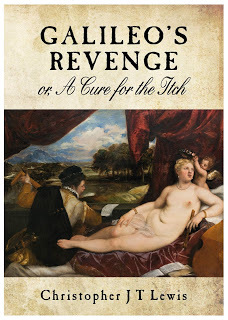 buy nowGalileo’s gap yearsWhen Galileo left the university of Pisa in 1585, aged 21, he had no proper job to go to. Returning to his family home in Florence, he struggled to make a living from a portfolio of activities: part-time teaching, casting horoscopes, playing on the lute . . . and gambling. At the same time he was trying to make a name for himself at the cultured but extravagant and debauched court of the Medici Dukes who ruled Tuscany.
buy nowGalileo’s gap yearsWhen Galileo left the university of Pisa in 1585, aged 21, he had no proper job to go to. Returning to his family home in Florence, he struggled to make a living from a portfolio of activities: part-time teaching, casting horoscopes, playing on the lute . . . and gambling. At the same time he was trying to make a name for himself at the cultured but extravagant and debauched court of the Medici Dukes who ruled Tuscany. Grand Duke FrancescoThe current head of the family was Francesco de’ Medici (1541-87): aloof, capricious and self-indulgent. Some ten years earlier, for example, upon the death of his first wife, the aristocratic Joanna of Austria, Francesco had scandalized his family and Florence by marrying his charismatic mistress, Bianca Cappello (1548-87). She was considered an unsuitable match because her parents were relatively humble merchants from VeniceArchimedesAt Pisa Galileo had been supposed to study the dominant Aristotelian philosophy of the day, with a view to further training to become a doctor. But he also became fascinated by mathematics, especially the mechanics of the ‘divine’ Archimedes (c.287-212 BCE). Archimedes had famously detected the fraudulent adulteration of a gold crown with silver by measuring its density – gold being heavier than silver. Now Galileo’s first published work, La bilancetta (1586), described his own invention of a neat ‘hydrostatic’ balance for quickly and accurately measuring the density of small objects. Such as gemstones.
The Medici jewelsMuch of the Medici collection of jewellery had been lent to Catherine de’ Medici (1519-89) to wear at her marriage to the King of France in 1533. Catherine was a fairly distant cousin of Duke Francesco, but actually it was she who came from the senior line of the family that had made the family fortunes in the 15th century. Francesco came from a relatively minor branch. Catherine had been slow to return the jewels. When she did, could Francesco be sure that they were genuine? At this time there were no hard-and-fast criteria for identifying a ruby, say, as ‘genuine’, and not a garnet or merely cleverly coloured glass. At the end of Galileo’s Bilancetta there is a list of densities measured with his balance: specimens of gold and silver, of course, but also a lengthy list of the densities of some rather substantial gemstones. Where could Galileo have accessed such treasures to study?
Galileo lab assistantIt is my conceit (only in the old-fashioned sense, of course) that Duke Francesco engaged Galileo as his assayer, to help him identify any fakes among the family jewels. And perhaps that Galileo – very knowledgeable, ingenious and dextrous, amusing and charming if he needed to be – insinuated himself as an accomplice to the Duke in his alchemical investigations. In other words, Galileo became His Highness’ laboratorio assistant.Galileo’s Revenge has a subtitle A Cure for the Itch. I am very fond of Jacobethan
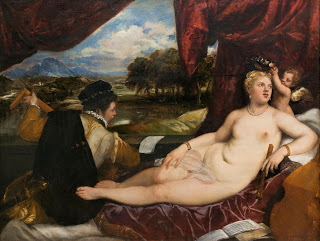
Galileo and meAlthough theoretical physics was my first love, I subsequently became fascinated by the history of science. I especially like the medieval and early modern periods: roughly, that is, everything from the Venerable Bede (c.673-735) to the Honourable Boyle (1627-91) and a bit beyond. But Galileo was always my particular favourite: initially his work on falling bodies, projectiles, and pendulums and such, and then more broadly his character, life and the wider world in which he lived and worked.A few years ago, therefore, I started work on a new, up-to-date biography of Galileo. Unfortunately (for me) a couple of other excellent scholars had already had the same idea. J.L.Heilbron’s brilliant Galileo, for example, came out in 2010 and I shelved my own project. But all was not lost. I have always loved crime fiction and historical fiction and above all historical crime fiction. (Yes, yes, I admit it, I adore Cadfael, even if he is the veritable white line down the middle of the road.) So I had already started working on an early draft of Galileo’s Revenge. How hard can creative writing be, I wondered? You just make it up as you go along. And I won’t have to check my references. A much older and slightly wiser man, I finally stopped writing last year.
Christopher J T Lewis
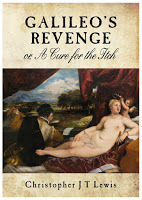 Florence, October 1587. the Duke of Tuscany drops dead unexpectedly. His brother the Cardinal starts a hunt for his assassin. Or for a suitable scapegoat? Galileo, a brilliant, impecunious - and unscrupulous - young scientist is struggling to make a name for himself at the corrupt court of the Medici. He is horrified to be arrested as the Duke's murderer: nothing burns so well as a wicked magician! His only hope is to find the real killer or at least a better scapegoat. His search takes him through the piazzas and palaces of Florence, through the barber shops and brothels, the cloisters and the taverns. Especially the taverns.
Florence, October 1587. the Duke of Tuscany drops dead unexpectedly. His brother the Cardinal starts a hunt for his assassin. Or for a suitable scapegoat? Galileo, a brilliant, impecunious - and unscrupulous - young scientist is struggling to make a name for himself at the corrupt court of the Medici. He is horrified to be arrested as the Duke's murderer: nothing burns so well as a wicked magician! His only hope is to find the real killer or at least a better scapegoat. His search takes him through the piazzas and palaces of Florence, through the barber shops and brothels, the cloisters and the taverns. Especially the taverns.[CL1]Oh, yes, and she had run away from home in the arms of a feckless bank clerk from Florence, to whom she was still married when she became the Duke’s mistress.
Published on March 27, 2019 04:08
March 8, 2019
The mercurial Dumouriez and the after effects of treachery.
by Dominic Fielder
Charles François Dumouriez is hardly the first name on anyone’s lips when having discussion of important figures in the wars of the coalitions against France, between 1793-1815. I had hoped to make it beyond the second sentence before saying the word ‘Napoleonic’ but so powerful is Napoleon Bonaparte’s stamp on the pages of history, that the wars of the First Coalition, the ‘Revolutionary Wars’, are often overlooked, dismissed with the status of BN, ‘before Napoleon!’ But in the early months of 1793, Dumouriez was centre stage, perhaps with even the control of France tantalisingly within his grasp.
The early career of Dumouriez was somewhat chequered. Born to a noble family and proving himself a very brave soldier in the Seven Years War, Dumouriez undertook a series of military roles which eventually drew him into the Secret du Roi, one of the inner circles of Louis XV. A downturn in fortune followed when Dumouriez was ordered on a diplomatic mission to Poland. Far from the mission remaining purely political, Dumouriez organised his own militia formation, only for those forces to be routed in battle by the great Russian General Alexander Suvorov, at the battle of Lanckorona (1771). Dumouriez’ forces were apparently caught off guard in the dawn attack and this has led some historians to conjecture whether Dumouriez, who had expressed some anti-Polish sentiments, had been in some form of collusion with Suvorov.
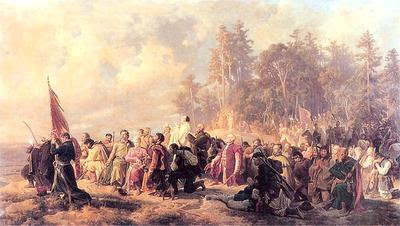 Prayer of the Bar Confederates before the battle of Lanckorona – by Artur GrottgerReturning to France and taking a post under the Secretary of State for War, a position he was briefly later to hold as his own, Dumouriez found himself thrown into the Bastille for six months in 1773, under charges of diverting money intending for bribery and spying, to pay his own spiralling debts. With the death of Louis XV, previous sins were forgiven and, recalled to court, Dumouriez served Louis XVI in a post under the new Secretary of War, the Count of Saint-Germain. Somewhere in this time, Dumouriez had married but by 1789, the marriage ended in separation. Fortescue in his History of the British Army in Flanders informs us that Dumouriez was a handsome and popular figure at court, a phrase that resounds of Hilary Clinton’s description of her errant husband, ‘a hard dog to keep on the porch’.
Prayer of the Bar Confederates before the battle of Lanckorona – by Artur GrottgerReturning to France and taking a post under the Secretary of State for War, a position he was briefly later to hold as his own, Dumouriez found himself thrown into the Bastille for six months in 1773, under charges of diverting money intending for bribery and spying, to pay his own spiralling debts. With the death of Louis XV, previous sins were forgiven and, recalled to court, Dumouriez served Louis XVI in a post under the new Secretary of War, the Count of Saint-Germain. Somewhere in this time, Dumouriez had married but by 1789, the marriage ended in separation. Fortescue in his History of the British Army in Flanders informs us that Dumouriez was a handsome and popular figure at court, a phrase that resounds of Hilary Clinton’s description of her errant husband, ‘a hard dog to keep on the porch’.
At the outbreak of the revolution, Dumouriez joined the Jacobin club, and took up a post as the military commander in the Nantes region. The was a change of political allegiance to the Girondins, a movement which believed in spreading the principles of revolution into Flanders and the countries beyond. This was no meeting of ideals. The Girondins needed a general in the army to improve their military clout and Dumouriez wanted voices in the assembly to further his career. August the 10th 1792 provided that another step up to power. The Tuileries Palace was stormed. Louis XIV, who had been rather hapless in operating within the constraints of the new constitutional monarchy, had ignored the will of the constituent National Assembly. His final act of indifference was to those most loyal to him, allowing his Swiss Royal Guard to fight outnumbered after he had fled the Tuileries.
Elsewhere, the Marquis de LaFayette, a hero from the American War of Independence and ardent monarchist, had attempted to lead his army over to the allied forces of Austria and Prussia, who waited on the French border. Responding to the crisis, Dumouriez was appointed to command the ‘Army of the Centre’ (soon to be the Army of the North), directing his subordinate Kellerman to defeat of the Prussians at Valmy, in September 1792, and then his own forces defeated an Austrian army at Jemappes three months later. Under Dumouriez, the Army of the North and the Army of the Ardennes, nominally under his direction, pushed into Flanders and were welcomed as liberators.The next five months were the most critical in the life of Dumouriez; a life-time of acquired political skills, soldiery and personal flaws were about to converge.
The National Assembly, unable perhaps even unwilling to properly supply the Army of the North, the remembrance of Lafayette’s treachery still weighing heavy, declared that the people of Flanders and Walloon were not to be protected as French citizens. Soldiers were at liberty to take whatever was needed to order to survive, as an army of occupation. At the stroke of a pen, friendly provinces became hostile to hungry and marauding soldiers as discipline evaporated. Lynn, in his excellent Bayonets of the Republic, estimates that the whole army shrank from around 450,000 to 290,000 as soldiers absented themselves, in the harsh winter.
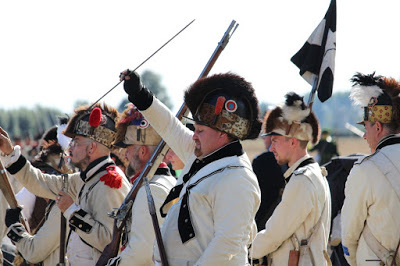 Soldiers of the old royal army stood shoulder to shoulder with the new recruits of the Levée en Masse.Between November and early February, Dumouriez returned to Paris, quarrelling with the National Assembly and sharing a private council with the deposed King, now sentenced to death. Dumouriez was, according to Fortescue, the last person to have such an audience with Louis XVI, a point that must have alarmed those Jacobin members of the National Assembly.
Soldiers of the old royal army stood shoulder to shoulder with the new recruits of the Levée en Masse.Between November and early February, Dumouriez returned to Paris, quarrelling with the National Assembly and sharing a private council with the deposed King, now sentenced to death. Dumouriez was, according to Fortescue, the last person to have such an audience with Louis XVI, a point that must have alarmed those Jacobin members of the National Assembly.
Whatever Dumouriez planned to do next is open for discussion, his memoirs of the final weeks of his command put a bias on his actions, for a man who needed royal employment in the world of the late eighteenth century, a monarchist imperative: one not shared by J.W Fortescue. In Fortescue’s eyes, the lightning offensive that Dumouriez attempted was designed to seize Amsterdam and her deposits of gold. Nominally this objective was given to him by Paris but within a fortnight the National Assembly began stripping troops away from Dumouriez to reinforce the Army of Ardennes, now under the command of General Miranda, a friend and confident.
Ultimately Dumouriez’ offensive was called off and the Army of the North moved to counter the threat of the Austrians under Prince Josias. Fortescue says that the actions of Dumouriez were done under ‘bad grace’, perhaps it’s this tone that alerts Paris to a potential problem, but that reason feels unconvincing.
Two major actions were fought, one at Neerwinden on the 18th of March, where the Austrians were victorious against the Armies of the North and Ardennes, and another four days later, where the French fought a rear-guard action. Again, it was another defeat but the speed of the Austrian pursuit slowed.
By the 25th Dumouriez had entered into discussions with Colonel Mack, Prince Josias’ trusted advisor and two days later, there was agreement on a formal alliance, with Dumouriez seemly convinced that the army would follow him over to fight in conjunction with Austria, to march on Paris and restore the House of the Bourbons to the throne.
On the 1st of April, four members of the Convention in Paris arrive to arrest Dumouriez. Instead, he arrests them, surrounded by his loyal 1st Hussars, many of German extraction. Four days later Dumouriez rode into the Austrian camp. Five thousand men, around an eighth of his army followed him.
In exile, he drifted from capital to capital, watching the revolution continue to survive and by the time that Napoleon had seized power, Dumouriez was an unofficial advisor in London; a nearly-man without a nation to call home.
There is something in that narrative that troubles me. It’s a combination of the timings and just a hunch about the character of Dumouriez. Had he reached Amsterdam, Dumouriez would have been in a very strong bargaining position. Even if he had been forced to retreat, the army had shown itself adept at stripping the Belgian provinces of plate and just about anything else. The offensive feels more like a bank heist than a sound military manoeuvre. In William Hague ‘Pitt the Younger’ there is reference to British gold being involved in both the Dumouriez affair and the bribery of French officials; diverting money was an old skill of Dumouriez but now the stakes were much bigger. And then there is the arrival of the four men from Paris. There must have been something that alerted them to Dumouriez’ intentions days before the 25th March. Six days for secret negotiations to be discovered, Paris informed, a decision made and representatives dispatched is unworkable in the late eighteenth century.
So, what I am suggesting? Collusion, probably with Austria and Britain: Dumouriez, the man who would be king. Well, not king but at least a more palatable form of government than offering the people the immediate restoration of the House of Bourbon. The National Assembly was able to act because someone within the Dumouriez inner circle was informing them. The master politician would have found a way to start negotiations before battle, perhaps selling the idea to Prince Josias that the Army of the North needed to fight, in order to not feel as though it were betraying France. Furthermore, a victory at Neerwinden would have significantly strengthen Dumouriez’ position with Austria and perhaps made the lie easier to sell to his men?
Of course, none of that can be proved. That’s the beauty of fiction. And there is always that hope that one day, a note might surface, written in the days before the 18th of March 1793 to justify my faith in Dumouriez’ nature.
In the aftermath of his defection, France and the revolution changed for the worst. Girondins were chased from office and in the Terror, that occurred a few months later, their opposition to the Jacobins was ended as thousands of Girondin supporters were sent to the guillotine. Commanders of the Army of the North also paid a heavy price for the treachery of Dumouriez. Two were executed: one, Houchard, after delivering victory over the Duke of York’s German allies at Hondschoote. Political infiltration happened throughout the army with Representatives en Mission, carrying the authority of the National Assembly and often with no military experience, could force commanders to undertake military actions which defied any logic. France teetered until eventually a man named Napoleon could do what Charles François Dumouriez could only dream of. About Dominic Fielder
 The King’s Germans is a project that has been many years in the making. Currently I manage to juggle writing and research around a crowded work and family life. The Black Lions of Flanders (set in 1793) is the first in the King’s Germans’ series, which will follow an array of characters through to the final book in Waterloo. The King of Dunkirk will soon be released and I hope that the response to that is as encouraging as the reviews of Black Lions have been.While I’m self-published now, I have an excellent support team that help me to produce what I hope is a story with professional feel, and that readers would want to read more than once. My family back-ground is in paperback book sales, so I’m very keen to ensure that the paperback design is something that I would be proud to put on my bookshelf. I live just outside of Tavistock, Devon, where I enjoy walking on the moors and the occasional horse-riding excursion as both inspiration and relaxation.
The King’s Germans is a project that has been many years in the making. Currently I manage to juggle writing and research around a crowded work and family life. The Black Lions of Flanders (set in 1793) is the first in the King’s Germans’ series, which will follow an array of characters through to the final book in Waterloo. The King of Dunkirk will soon be released and I hope that the response to that is as encouraging as the reviews of Black Lions have been.While I’m self-published now, I have an excellent support team that help me to produce what I hope is a story with professional feel, and that readers would want to read more than once. My family back-ground is in paperback book sales, so I’m very keen to ensure that the paperback design is something that I would be proud to put on my bookshelf. I live just outside of Tavistock, Devon, where I enjoy walking on the moors and the occasional horse-riding excursion as both inspiration and relaxation.

Buy links
Buy links
https://www.amazon.co.uk/dp/B07HMHY24Q
https://www.amazon.co.uk/dp/B07N6B7XRN
Social media
https://www.facebook.com/KingsGermans/
@Kings_Germans (Twitter)
kingsgermans (Instagram)
From The Black Lions of FlandersAntwerp: 16th February 1793
Rain, driven by bitter north-easterly winds, ushered the ‘Army of the North’ away from Antwerp’s Grande Place and on towards the Dutch border. Buildings wore sagging and weary tricolours and under these a handful of inhabitants had gathered, as glad to see the French leave as they had been to welcome them, weeks before. In the previous November, the southern provinces of the Austrian Netherlands had waited keenly to receive the victorious French army, a sentiment long since passed.Serge Genet had watched the exodus from a partially frosted window for a few minutes before returning to a fastidiously tidy desk in one of the rooms of the Grand Palace, which formed part of the main square. A gently steaming coffee pot awaited an imminent arrival. Parallel tables contained an undisturbed breakfast array of pastries and cold meats on one side and a series of maps and plans on the other. Genet surveyed the scene with a degree of satisfaction, before removing delicate silver framed glasses and cleaning them on the silken tricolour sash tied about his waistcoat.“I’m not sure that’s the prescribed use for a sash of office, Serge?” said an assured voice.The double doors to the room had burst open amidst the task of spectacle cleaning. A slender, sodden figure unchained a blue cloak and hurled it in the vague direction of a cloak stand, followed by an equally saturated bicorne which cart-wheeled ribbons of spray over the varnished mahogany floor. General Dumouriez strode across the room, made for the silver coffee pot and poured himself a cup while a servant, wearing the livery of the household of King Louis, tidied the abandoned garments before retiring from the scene. The General drew back a chair and settled back with his feet on Genet's desk, rivulets of water running down the leather and threatening the neatly arranged correspondence. The servant returned with the intent of removing the heavy riding boots but Dumouriez shooed him away, wagging a playful finger. “No, no, leave that. I’m leaving soon and you should be packing.” The servant bowed and left the two men. Dumouriez ran his hand through thinning silver hair; he had long since lost the pretention and taste for formal wigs. Having just turned fifty-four he retained a lean physique. Piercing dark brown eyes shone from a face that retained the vestiges of youthful charm that had made him a favourite at the Royal Court for thirty years. Allied to this was an air of command which drew unconditional loyalty. Men followed Dumouriez, but both he and Genet knew a test of loyalty for every soldier setting out towards the Dutch border might come sooner than either man might wish.The man in clerk’s clothes moved sharply to rescue documents from a puddle forming on the green leather covering of the desk. Even though he found this intrusion into his world of order deeply disturbing, he was too respectful of the General to voice a rebuke.Refreshed by the hot coffee, Dumouriez contemplated the choice of overdue breakfast but instead seized a quill from the desk and motioned Genet to pass the documents to him. In truth only the last two were of interest but he took his time to read each before scrawling his signature.“You will have our best people on these?” Dumouriez asked, already knowing the answer but betraying just a hint of the gravity that each message contained. “Yes, sir,” replied Genet.“You will use the Countess for this?” Dumouriez asked, almost rhetorically, a relaxed smile returning to his face. “Yes, sir. And Beauvais will carry the message to Dunkirk and then on to Paris with the dispatches. It will give us the time we need, I think.” Genet’s words trailed away and Dumouriez looked at him but knew that pursuing the matter was of little value. Instead, he spoke with a reassuringly warm tone, “Don’t worry my friend, all will be well.” Craning his neck, the General called out, “Julien, get your sorry backside in here!” The door was flung open with a force that rattled ancient hinges, the void almost filled with the frame with of a man whose muscular torso was squeezed into a tightly fitted short green dragoon’s jacket. As the figure advanced Genet could see the grey, dead right eye and vivid vermilion scar that ran from chin to temple. Captain Julien Beauvais stood to attention.Genet never failed to find the sight of Beauvais both imposing and galling. The clerk had winced whenever Dumouriez recounted the tale that lead to an Austrian bayonet tearing the right-hand side of the dragoon’s face apart. There was little doubt that Beauvais had saved Dumouriez’ life and become a favoured pet in the process. “Prepare yourself and two men. You leave for Dunkirk as soon as these communications are ready.” Beauvais nodded at Dumouriez’ order. “But before you go, help yourself to some of that food Julien, you are starting to look like a bloody scarecrow; then Dunkirk. No stopping to ravage half the women in Northern France. And try not to kill any more villagers. The mayor of whatever shit-hole you slept in last week had the temerity to write and say that some demonic creature cut down half of the townsfolk before riding off into the morning.”“It was two men, sir and they did seem intent on killing me first,” the dragoon hissed.“Funnily enough the mayor forgot to mention that. These people already consider me the devil incarnate for the actions of the army. You are my emissary. Try and keep it to a maiming or two next time and you will make Genet’s task of drafting a suitably pliant reply a little easier.”Beauvais’ faced twitched into an awkward, broken smile and Genet marvelled at the General’s skill. With a few well-chosen plaudits and a thoughtful act, men like Beauvais would follow their General time and again, whatever the personal cost. While both soldiers breakfasted, Genet sealed several documents handing Beauvais all of the communications bar one. “You might find this useful in dealing with the Mayor of Dunkirk,” Genet paused. “Should his co-operation be less then complete, find the town’s garrison commander and have everyone on this list arrested.” Genet knew Grison, Dunkirk's new mayor, would not buckle. Only by a display of naked power could Grison be brought to heel. Without proper leverage Grison would protect the man he and Dumouriez needed. “His family and friends that I know of. Choose some and have them…” Genet waved his hand, the words dried in his mouth. Spying was Genet’s business, killing was Beauvais’. The dragoon pouched the note in a waistcoat pocket, nodded and turned away, returning for a final sortie at the breakfast table. The chief of intelligence had found a skill in setting challenges that one might previously think were beneath the compass of a cavalry officer. But in the month since his posting to Dumouriez’ staff, Julien Beauvais was clearly enjoying the freedom and opportunities that life at headquarters provided.Dumouriez had moved to examine a series of maps, gently drumming his fingers before looking at Genet, “How are you getting on with those diamonds? Paying the bills?”Since the arrival of the French, what little trade there had been in the port appeared to have ceased. Most of Antwerp’s diamond trade had relocated to Amsterdam. Genet had struck a deal with those who remained, a protection tax, but it did not yield anywhere near the money that the army needed to make good a deliberate shortfall from Paris. “Diamonds have been difficult, sir; to trade with I mean. We end up selling them back to the traders we had collected them from, who tell us the market is depressed because we have driven the buyers away. Gold would be more useful in that regard,” Genet offered.“Diamonds, difficult? You have clearly never had a wife and a mistress, Serge!” Dumouriez chuckled and then coughed almost apologetically at seeing the face of his Chief of Intelligence, a hapless bachelor.“You are right of course but in three weeks’ time none of that will matter. Amsterdam: that is all that matters.” Dumouriez returned to study the maps for a few moments. “We are going to capture Amsterdam, collect half the gold of Europe sat in its banks and win the war! That should bring a smile to even your worried face, my friend.” The General turned and swooped on an unmolested croissant on the breakfast table, polished it off and flashed a self-satisfied smile to his spy-master.
Charles François Dumouriez is hardly the first name on anyone’s lips when having discussion of important figures in the wars of the coalitions against France, between 1793-1815. I had hoped to make it beyond the second sentence before saying the word ‘Napoleonic’ but so powerful is Napoleon Bonaparte’s stamp on the pages of history, that the wars of the First Coalition, the ‘Revolutionary Wars’, are often overlooked, dismissed with the status of BN, ‘before Napoleon!’ But in the early months of 1793, Dumouriez was centre stage, perhaps with even the control of France tantalisingly within his grasp.
The early career of Dumouriez was somewhat chequered. Born to a noble family and proving himself a very brave soldier in the Seven Years War, Dumouriez undertook a series of military roles which eventually drew him into the Secret du Roi, one of the inner circles of Louis XV. A downturn in fortune followed when Dumouriez was ordered on a diplomatic mission to Poland. Far from the mission remaining purely political, Dumouriez organised his own militia formation, only for those forces to be routed in battle by the great Russian General Alexander Suvorov, at the battle of Lanckorona (1771). Dumouriez’ forces were apparently caught off guard in the dawn attack and this has led some historians to conjecture whether Dumouriez, who had expressed some anti-Polish sentiments, had been in some form of collusion with Suvorov.
 Prayer of the Bar Confederates before the battle of Lanckorona – by Artur GrottgerReturning to France and taking a post under the Secretary of State for War, a position he was briefly later to hold as his own, Dumouriez found himself thrown into the Bastille for six months in 1773, under charges of diverting money intending for bribery and spying, to pay his own spiralling debts. With the death of Louis XV, previous sins were forgiven and, recalled to court, Dumouriez served Louis XVI in a post under the new Secretary of War, the Count of Saint-Germain. Somewhere in this time, Dumouriez had married but by 1789, the marriage ended in separation. Fortescue in his History of the British Army in Flanders informs us that Dumouriez was a handsome and popular figure at court, a phrase that resounds of Hilary Clinton’s description of her errant husband, ‘a hard dog to keep on the porch’.
Prayer of the Bar Confederates before the battle of Lanckorona – by Artur GrottgerReturning to France and taking a post under the Secretary of State for War, a position he was briefly later to hold as his own, Dumouriez found himself thrown into the Bastille for six months in 1773, under charges of diverting money intending for bribery and spying, to pay his own spiralling debts. With the death of Louis XV, previous sins were forgiven and, recalled to court, Dumouriez served Louis XVI in a post under the new Secretary of War, the Count of Saint-Germain. Somewhere in this time, Dumouriez had married but by 1789, the marriage ended in separation. Fortescue in his History of the British Army in Flanders informs us that Dumouriez was a handsome and popular figure at court, a phrase that resounds of Hilary Clinton’s description of her errant husband, ‘a hard dog to keep on the porch’. At the outbreak of the revolution, Dumouriez joined the Jacobin club, and took up a post as the military commander in the Nantes region. The was a change of political allegiance to the Girondins, a movement which believed in spreading the principles of revolution into Flanders and the countries beyond. This was no meeting of ideals. The Girondins needed a general in the army to improve their military clout and Dumouriez wanted voices in the assembly to further his career. August the 10th 1792 provided that another step up to power. The Tuileries Palace was stormed. Louis XIV, who had been rather hapless in operating within the constraints of the new constitutional monarchy, had ignored the will of the constituent National Assembly. His final act of indifference was to those most loyal to him, allowing his Swiss Royal Guard to fight outnumbered after he had fled the Tuileries.
Elsewhere, the Marquis de LaFayette, a hero from the American War of Independence and ardent monarchist, had attempted to lead his army over to the allied forces of Austria and Prussia, who waited on the French border. Responding to the crisis, Dumouriez was appointed to command the ‘Army of the Centre’ (soon to be the Army of the North), directing his subordinate Kellerman to defeat of the Prussians at Valmy, in September 1792, and then his own forces defeated an Austrian army at Jemappes three months later. Under Dumouriez, the Army of the North and the Army of the Ardennes, nominally under his direction, pushed into Flanders and were welcomed as liberators.The next five months were the most critical in the life of Dumouriez; a life-time of acquired political skills, soldiery and personal flaws were about to converge.
The National Assembly, unable perhaps even unwilling to properly supply the Army of the North, the remembrance of Lafayette’s treachery still weighing heavy, declared that the people of Flanders and Walloon were not to be protected as French citizens. Soldiers were at liberty to take whatever was needed to order to survive, as an army of occupation. At the stroke of a pen, friendly provinces became hostile to hungry and marauding soldiers as discipline evaporated. Lynn, in his excellent Bayonets of the Republic, estimates that the whole army shrank from around 450,000 to 290,000 as soldiers absented themselves, in the harsh winter.
 Soldiers of the old royal army stood shoulder to shoulder with the new recruits of the Levée en Masse.Between November and early February, Dumouriez returned to Paris, quarrelling with the National Assembly and sharing a private council with the deposed King, now sentenced to death. Dumouriez was, according to Fortescue, the last person to have such an audience with Louis XVI, a point that must have alarmed those Jacobin members of the National Assembly.
Soldiers of the old royal army stood shoulder to shoulder with the new recruits of the Levée en Masse.Between November and early February, Dumouriez returned to Paris, quarrelling with the National Assembly and sharing a private council with the deposed King, now sentenced to death. Dumouriez was, according to Fortescue, the last person to have such an audience with Louis XVI, a point that must have alarmed those Jacobin members of the National Assembly. Whatever Dumouriez planned to do next is open for discussion, his memoirs of the final weeks of his command put a bias on his actions, for a man who needed royal employment in the world of the late eighteenth century, a monarchist imperative: one not shared by J.W Fortescue. In Fortescue’s eyes, the lightning offensive that Dumouriez attempted was designed to seize Amsterdam and her deposits of gold. Nominally this objective was given to him by Paris but within a fortnight the National Assembly began stripping troops away from Dumouriez to reinforce the Army of Ardennes, now under the command of General Miranda, a friend and confident.
Ultimately Dumouriez’ offensive was called off and the Army of the North moved to counter the threat of the Austrians under Prince Josias. Fortescue says that the actions of Dumouriez were done under ‘bad grace’, perhaps it’s this tone that alerts Paris to a potential problem, but that reason feels unconvincing.
Two major actions were fought, one at Neerwinden on the 18th of March, where the Austrians were victorious against the Armies of the North and Ardennes, and another four days later, where the French fought a rear-guard action. Again, it was another defeat but the speed of the Austrian pursuit slowed.
By the 25th Dumouriez had entered into discussions with Colonel Mack, Prince Josias’ trusted advisor and two days later, there was agreement on a formal alliance, with Dumouriez seemly convinced that the army would follow him over to fight in conjunction with Austria, to march on Paris and restore the House of the Bourbons to the throne.
On the 1st of April, four members of the Convention in Paris arrive to arrest Dumouriez. Instead, he arrests them, surrounded by his loyal 1st Hussars, many of German extraction. Four days later Dumouriez rode into the Austrian camp. Five thousand men, around an eighth of his army followed him.
In exile, he drifted from capital to capital, watching the revolution continue to survive and by the time that Napoleon had seized power, Dumouriez was an unofficial advisor in London; a nearly-man without a nation to call home.
There is something in that narrative that troubles me. It’s a combination of the timings and just a hunch about the character of Dumouriez. Had he reached Amsterdam, Dumouriez would have been in a very strong bargaining position. Even if he had been forced to retreat, the army had shown itself adept at stripping the Belgian provinces of plate and just about anything else. The offensive feels more like a bank heist than a sound military manoeuvre. In William Hague ‘Pitt the Younger’ there is reference to British gold being involved in both the Dumouriez affair and the bribery of French officials; diverting money was an old skill of Dumouriez but now the stakes were much bigger. And then there is the arrival of the four men from Paris. There must have been something that alerted them to Dumouriez’ intentions days before the 25th March. Six days for secret negotiations to be discovered, Paris informed, a decision made and representatives dispatched is unworkable in the late eighteenth century.
So, what I am suggesting? Collusion, probably with Austria and Britain: Dumouriez, the man who would be king. Well, not king but at least a more palatable form of government than offering the people the immediate restoration of the House of Bourbon. The National Assembly was able to act because someone within the Dumouriez inner circle was informing them. The master politician would have found a way to start negotiations before battle, perhaps selling the idea to Prince Josias that the Army of the North needed to fight, in order to not feel as though it were betraying France. Furthermore, a victory at Neerwinden would have significantly strengthen Dumouriez’ position with Austria and perhaps made the lie easier to sell to his men?
Of course, none of that can be proved. That’s the beauty of fiction. And there is always that hope that one day, a note might surface, written in the days before the 18th of March 1793 to justify my faith in Dumouriez’ nature.
In the aftermath of his defection, France and the revolution changed for the worst. Girondins were chased from office and in the Terror, that occurred a few months later, their opposition to the Jacobins was ended as thousands of Girondin supporters were sent to the guillotine. Commanders of the Army of the North also paid a heavy price for the treachery of Dumouriez. Two were executed: one, Houchard, after delivering victory over the Duke of York’s German allies at Hondschoote. Political infiltration happened throughout the army with Representatives en Mission, carrying the authority of the National Assembly and often with no military experience, could force commanders to undertake military actions which defied any logic. France teetered until eventually a man named Napoleon could do what Charles François Dumouriez could only dream of. About Dominic Fielder
 The King’s Germans is a project that has been many years in the making. Currently I manage to juggle writing and research around a crowded work and family life. The Black Lions of Flanders (set in 1793) is the first in the King’s Germans’ series, which will follow an array of characters through to the final book in Waterloo. The King of Dunkirk will soon be released and I hope that the response to that is as encouraging as the reviews of Black Lions have been.While I’m self-published now, I have an excellent support team that help me to produce what I hope is a story with professional feel, and that readers would want to read more than once. My family back-ground is in paperback book sales, so I’m very keen to ensure that the paperback design is something that I would be proud to put on my bookshelf. I live just outside of Tavistock, Devon, where I enjoy walking on the moors and the occasional horse-riding excursion as both inspiration and relaxation.
The King’s Germans is a project that has been many years in the making. Currently I manage to juggle writing and research around a crowded work and family life. The Black Lions of Flanders (set in 1793) is the first in the King’s Germans’ series, which will follow an array of characters through to the final book in Waterloo. The King of Dunkirk will soon be released and I hope that the response to that is as encouraging as the reviews of Black Lions have been.While I’m self-published now, I have an excellent support team that help me to produce what I hope is a story with professional feel, and that readers would want to read more than once. My family back-ground is in paperback book sales, so I’m very keen to ensure that the paperback design is something that I would be proud to put on my bookshelf. I live just outside of Tavistock, Devon, where I enjoy walking on the moors and the occasional horse-riding excursion as both inspiration and relaxation.

Buy links
Buy links
https://www.amazon.co.uk/dp/B07HMHY24Q
https://www.amazon.co.uk/dp/B07N6B7XRN
Social media
https://www.facebook.com/KingsGermans/
@Kings_Germans (Twitter)
kingsgermans (Instagram)
From The Black Lions of FlandersAntwerp: 16th February 1793
Rain, driven by bitter north-easterly winds, ushered the ‘Army of the North’ away from Antwerp’s Grande Place and on towards the Dutch border. Buildings wore sagging and weary tricolours and under these a handful of inhabitants had gathered, as glad to see the French leave as they had been to welcome them, weeks before. In the previous November, the southern provinces of the Austrian Netherlands had waited keenly to receive the victorious French army, a sentiment long since passed.Serge Genet had watched the exodus from a partially frosted window for a few minutes before returning to a fastidiously tidy desk in one of the rooms of the Grand Palace, which formed part of the main square. A gently steaming coffee pot awaited an imminent arrival. Parallel tables contained an undisturbed breakfast array of pastries and cold meats on one side and a series of maps and plans on the other. Genet surveyed the scene with a degree of satisfaction, before removing delicate silver framed glasses and cleaning them on the silken tricolour sash tied about his waistcoat.“I’m not sure that’s the prescribed use for a sash of office, Serge?” said an assured voice.The double doors to the room had burst open amidst the task of spectacle cleaning. A slender, sodden figure unchained a blue cloak and hurled it in the vague direction of a cloak stand, followed by an equally saturated bicorne which cart-wheeled ribbons of spray over the varnished mahogany floor. General Dumouriez strode across the room, made for the silver coffee pot and poured himself a cup while a servant, wearing the livery of the household of King Louis, tidied the abandoned garments before retiring from the scene. The General drew back a chair and settled back with his feet on Genet's desk, rivulets of water running down the leather and threatening the neatly arranged correspondence. The servant returned with the intent of removing the heavy riding boots but Dumouriez shooed him away, wagging a playful finger. “No, no, leave that. I’m leaving soon and you should be packing.” The servant bowed and left the two men. Dumouriez ran his hand through thinning silver hair; he had long since lost the pretention and taste for formal wigs. Having just turned fifty-four he retained a lean physique. Piercing dark brown eyes shone from a face that retained the vestiges of youthful charm that had made him a favourite at the Royal Court for thirty years. Allied to this was an air of command which drew unconditional loyalty. Men followed Dumouriez, but both he and Genet knew a test of loyalty for every soldier setting out towards the Dutch border might come sooner than either man might wish.The man in clerk’s clothes moved sharply to rescue documents from a puddle forming on the green leather covering of the desk. Even though he found this intrusion into his world of order deeply disturbing, he was too respectful of the General to voice a rebuke.Refreshed by the hot coffee, Dumouriez contemplated the choice of overdue breakfast but instead seized a quill from the desk and motioned Genet to pass the documents to him. In truth only the last two were of interest but he took his time to read each before scrawling his signature.“You will have our best people on these?” Dumouriez asked, already knowing the answer but betraying just a hint of the gravity that each message contained. “Yes, sir,” replied Genet.“You will use the Countess for this?” Dumouriez asked, almost rhetorically, a relaxed smile returning to his face. “Yes, sir. And Beauvais will carry the message to Dunkirk and then on to Paris with the dispatches. It will give us the time we need, I think.” Genet’s words trailed away and Dumouriez looked at him but knew that pursuing the matter was of little value. Instead, he spoke with a reassuringly warm tone, “Don’t worry my friend, all will be well.” Craning his neck, the General called out, “Julien, get your sorry backside in here!” The door was flung open with a force that rattled ancient hinges, the void almost filled with the frame with of a man whose muscular torso was squeezed into a tightly fitted short green dragoon’s jacket. As the figure advanced Genet could see the grey, dead right eye and vivid vermilion scar that ran from chin to temple. Captain Julien Beauvais stood to attention.Genet never failed to find the sight of Beauvais both imposing and galling. The clerk had winced whenever Dumouriez recounted the tale that lead to an Austrian bayonet tearing the right-hand side of the dragoon’s face apart. There was little doubt that Beauvais had saved Dumouriez’ life and become a favoured pet in the process. “Prepare yourself and two men. You leave for Dunkirk as soon as these communications are ready.” Beauvais nodded at Dumouriez’ order. “But before you go, help yourself to some of that food Julien, you are starting to look like a bloody scarecrow; then Dunkirk. No stopping to ravage half the women in Northern France. And try not to kill any more villagers. The mayor of whatever shit-hole you slept in last week had the temerity to write and say that some demonic creature cut down half of the townsfolk before riding off into the morning.”“It was two men, sir and they did seem intent on killing me first,” the dragoon hissed.“Funnily enough the mayor forgot to mention that. These people already consider me the devil incarnate for the actions of the army. You are my emissary. Try and keep it to a maiming or two next time and you will make Genet’s task of drafting a suitably pliant reply a little easier.”Beauvais’ faced twitched into an awkward, broken smile and Genet marvelled at the General’s skill. With a few well-chosen plaudits and a thoughtful act, men like Beauvais would follow their General time and again, whatever the personal cost. While both soldiers breakfasted, Genet sealed several documents handing Beauvais all of the communications bar one. “You might find this useful in dealing with the Mayor of Dunkirk,” Genet paused. “Should his co-operation be less then complete, find the town’s garrison commander and have everyone on this list arrested.” Genet knew Grison, Dunkirk's new mayor, would not buckle. Only by a display of naked power could Grison be brought to heel. Without proper leverage Grison would protect the man he and Dumouriez needed. “His family and friends that I know of. Choose some and have them…” Genet waved his hand, the words dried in his mouth. Spying was Genet’s business, killing was Beauvais’. The dragoon pouched the note in a waistcoat pocket, nodded and turned away, returning for a final sortie at the breakfast table. The chief of intelligence had found a skill in setting challenges that one might previously think were beneath the compass of a cavalry officer. But in the month since his posting to Dumouriez’ staff, Julien Beauvais was clearly enjoying the freedom and opportunities that life at headquarters provided.Dumouriez had moved to examine a series of maps, gently drumming his fingers before looking at Genet, “How are you getting on with those diamonds? Paying the bills?”Since the arrival of the French, what little trade there had been in the port appeared to have ceased. Most of Antwerp’s diamond trade had relocated to Amsterdam. Genet had struck a deal with those who remained, a protection tax, but it did not yield anywhere near the money that the army needed to make good a deliberate shortfall from Paris. “Diamonds have been difficult, sir; to trade with I mean. We end up selling them back to the traders we had collected them from, who tell us the market is depressed because we have driven the buyers away. Gold would be more useful in that regard,” Genet offered.“Diamonds, difficult? You have clearly never had a wife and a mistress, Serge!” Dumouriez chuckled and then coughed almost apologetically at seeing the face of his Chief of Intelligence, a hapless bachelor.“You are right of course but in three weeks’ time none of that will matter. Amsterdam: that is all that matters.” Dumouriez returned to study the maps for a few moments. “We are going to capture Amsterdam, collect half the gold of Europe sat in its banks and win the war! That should bring a smile to even your worried face, my friend.” The General turned and swooped on an unmolested croissant on the breakfast table, polished it off and flashed a self-satisfied smile to his spy-master.
Published on March 08, 2019 01:02
February 2, 2019
Jennifer C. Wilson NEW RELEASE!
 In the Kindred Spirits series, we meet the ghosts of historical characters, in a range of contemporary settings. Have you ever wondered what Richard III and Anne Boleyn might have in common, what Mary, Queen of Scots is getting up to now, or what happens when the visitors leave some of the most popular attractions in the country? Well, here’s your chance!
In the Kindred Spirits series, we meet the ghosts of historical characters, in a range of contemporary settings. Have you ever wondered what Richard III and Anne Boleyn might have in common, what Mary, Queen of Scots is getting up to now, or what happens when the visitors leave some of the most popular attractions in the country? Well, here’s your chance!In the fourth of the series, we’re heading to York, and a whole new community of ghosts are ready to greet us, including some visiting favourites, taking advantage of a much speedier transport system than they were ever used to…
Kindred Spirits: YorkRelease date: 31st January 2019Publisher: Crooked Cat BooksGenre: Paranormal historical fictionBlurb: In the ancient city of York, something sinister is stirring...What do a highwayman, an infamous traitor, and two hardened soldiers have in common? Centuries of friendship, a duty to the town, and a sense of mischief – until they realise that someone is trying to bring chaos to their home. Joining forces with local Vikings, the four friends keep an eye on the situation, but then, disaster strikes. Can peace be restored both inside and out of the city walls?Sales link: https://www.amazon.co.uk/Kindred-Spirits-York-Jennifer-Wilson-ebook/dp/B07KKLZ4DT/
Praise for the Kindred Spirits series“A light hearted, humorous, and at times tender read which you'll enjoy whether you like history or not.”“This light-hearted, imaginative read is a new take on historical fiction but make no mistake, this is not only a fun read but an educational tool.”“A brilliantly unique idea from a distinctive new voice in fiction.”“A darn good read.”

Praise for Kindred Spirits: YorkAnother joyous ghostly romp from the pen of Jennifer C. Wilson. The nightly ghost walks around the ancient city of York will never seem the same again after you read this – with its tales of kings and queens, saints and sinners (Dick Turpin and Guy Fawkes anyone?), spending their afterlives among the iconic streets and sites of the town they frequented in life. But this is no sleepy existence: unruly spirits are disrupting the lives of both the living and the dead. With Romans, Vikings, medieval warriors and traitors to the Crown never the most natural of companions, it takes little to stir them up to wreak some light-hearted ghostly havoc – until, that is, events take a shocking turn.... With early special guest appearances from some of my own favourite Yorkists (and a less-agreeable Tudor hanger-on) visiting a city they once loved, the book offers another sparkling cast of the dearly (not-quite) departed. What’s not to like? Except thinking once again ‘I wish I’d had that idea!’ – Alex Marchant, author of The Order of the White Boar.
I love this series and it’s going from strength to strength. This one was great, the author has created a little gem. From Richard III taking a day trip to Harry Hotspur, Dick Turpin and Guy Fawkes protecting their city, this is probably my favourite so far. Really looking forward to seeing where the author has us visiting next. – Amazon Reviewer.

About JenniferJennifer C. Wilson is a marine biologist by training, who developed an equal passion for history and historical fiction whilst stalking Mary, Queen of Scots on childhood holidays (she has since moved on to Richard III). Enrolling on an adult education workshop on her return to the north-east of England for work reignited her pastime of creative writing, and she has been filling notebooks ever since. In 2014, Jennifer won the Story Tyne short story competition, and has been working on a number of projects since, including co-hosting the North Tyneside Writers’ Circle. Her Kindred Spirits novels are published by Crooked Cat Books and her timeslip novella, The Last Plantagenet?, by Ocelot Press. She lives in North Tyneside, and is very proud of her approximately 2-inch sea view.
Website: https://jennifercwilsonwriter.wordpress.com/ Amazon: https://www.amazon.co.uk/Jennifer-Wilson/e/B018UBP1ZO/ Facebook: https://www.facebook.com/jennifercwilsonwriter/ Twitter: https://twitter.com/inkjunkie1984 Instagram: https://www.instagram.com/jennifercwilsonwriter/
Published on February 02, 2019 03:05

